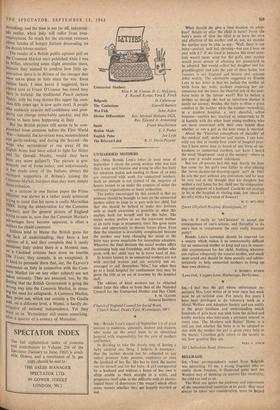Sin,--Brenda Leys's report of September 1 is of great interest
to midwives, almoners, doctors and students who make up the usual team in an obstetrical hospital with responsibility for the care of mothers and babies.
In deciding to take the drastic step of having a baby adopted one thing, I believe, is necessary: that the mother should not be subjected to any unfair pressure from parents, employers or even the landlord of her flat. She has to think the matter out for herself and for her baby. A girl unsupported by a husband and without a home of her own is often unable to think straight in a crisis, and pregnancy itself adds to the difficulty with its physio- logical bouts of depression ('the weeps') which affect many women whether they are happily married or not. When should she give a final decision on adop- tion? Before or after the child is born? From the baby's point of view the ideal is to have the love and affection of his mother and at, say, six months the mother may be able to say: 'Well, there is my baby—perfect, well fed, thriving—but can I bear to part with it?' If she lived in Jamaica this cruel ques- tion would never anse for the girl's own mother would never dream of allowing her grandchild to be adopted. She would collect her daughter and her granddaughter and take the pair of them home. but Jamaica is not England and history and customs differ widely. The alternative suggested by Brenda Leys in her letter is that we isolate the mother at birth from her baby, perhaps rendering her un- conscious lest she hears the cheerful yell of the new- born baby in the labour ward? But to isolate a Mother as though she had an infectious disease is surely no answer; besides, the baby is often a great comfort to the mother while the routine—nowadays, in a modern hospital, a very cheerful, active business—enables her,' married or unmarried, to fit in happily with the other busy young mothers, who are more concerned with their own babies than whether or not a girl in the next room is'married.
About the 'Victorian conceptions of morality' of the medical staff, midwives and nurses, I can hon- estly say that in twenty-four years of hospital prac- tice I have never seen or heard of any form of un- kindness to unmarried mothers, nor have I heard the word 'illegitimate' used in the nursery--where in any case it would sound ridiculous.
But not all parents feel this way. Surely the time has come for the girl's own fattier to stop playing the 'never-darken-my-doorstep-again act? In 1961 he acts the part without any conviction, and he may be very sad at the thought that his daughter has neither a real home for her child nor the companion- ship and support of a husband. Could he not arrange to be at the hospital at visiting time, just ahead of his wife, with a big bunch of flowers?
H. C. MCLAREN
Queen Elizabeth Hospital, Birmingham, 15


































 Previous page
Previous page